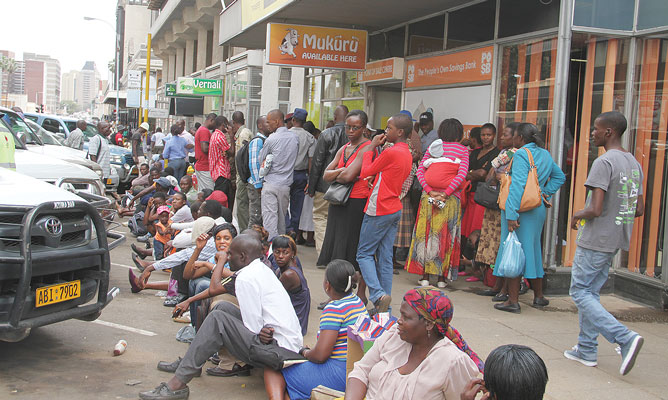THE uncertainty around regional budget airline Fastjet's future partly due to unremitted cash from its Zimbabwean operations has added credence to the view that Harare's currency problems "are killing business", analysts say.
This also comes as South African Airways has been battling to recover nearly R1 billion trapped in the country while several other businesses, including Shingi Munyeza's fast-food franchises, have been affected by the persistent cash shortages.
"…it is true that the cash crisis is killing the economy. The basic problem is foreign currency. If we can solve the foreign currency crisis, then the cash crisis will automatically go away," economist Tony Hawkins told The Financial Gazette yesterday, adding the recurring trade deficit - averaging $3 billion annually - was also depleting Zimbabwe's offshore accounts.
"The biggest mistake … was in mismanaging the forex situation. Now, there is no incentive for people to bring money back into the country and this translates to cash shortages," he said.
Piers Pigou, a Crisis Group senior consultant for southern Africa, not only said the Fastjet issue wasn't an isolated case, but emphasised that there was "no short-term solutions beyond securing financial support to cover these costs".
"Such support is only feasible if it is affordable and that new loans can be sustainably serviced. Otherwise, the debt hole just grows," he said.
"There is a backlog of foreign currency payments that are generating serious challenges for many companies. There is no option of printing money and companies will be subject to the vagaries of economic and political priorities," he said.
"At the heart of the challenge, government must exercise the fiscal discipline and cost cutting promises it has articulated. Evidence of this beyond rhetorical commitment is in short supply." Munyeza, whose businesses have borne the brunt of currency shortages, said he was greatly disheartened by the current liquidity crunch that recently forced him to "temporarily suspend" operations of his food and beverage franchises.
"The shortage of currency has been the singular contributor because franchisors could not continue without payment of their royalties. Otherwise these were profitable businesses and will be in the future. Once our currency situation improves, operations will resume," he said.
Munyeza started by scaling down operations at some of his franchises such as Ocean Basket, News Café and Mugg & Bean before temporarily shutting them down.
The former African Sun chief executive is believed to have ceded control of the Ocean Basket and News Café brands to Simbisa Group.
Another economist, George Lwanda, said the ongoing shortages were symptomatic of a confidence crisis in the economy and other deeper underlying problems.
"An accountable government will generate credibility and trust amongst the populace and investors. As this trust grows, the views of the government, investors and public on the expectations of prices in the future converge. This leads to the anchoring of inflation expectations - a key to successful monetary policy making," he said.
The United Nations Development Program Africa economic advisor said President Emmerson Mnangagwa's administration needed to ensure sufficient policy independence of the Ministry of Finance and Reserve Bank of Zimbabwe (RBZ), while aiming for conscious complementarity between monetary and fiscal policy.
"Sufficient policy independence… means that the two institutions are led and staffed by qualified people who can make … decisions based on the country's developmental goals, and non-political considerations..," he said.
Lwanda also called on Zimbabwe to rebuild the state's regulatory capacity among other things to ensure that existing legal institutions are able to investigate and prosecute misconduct in a timely, and objective manner.
"…government has to start investing in initiatives aimed at restarting the country's manufacturing sector and agro-industry productivity," he added.
And as Fastjet totters on the brink of collapse, with the low-cost carrier's shares falling by 70 percent on the London Stock Exchange last week, John Moxon's Meikles Limited has had to dispose off its financial services arm due to the biting cash shortages and constant policy changes by the Harare administration.
Trading under the MyCash banner or brand, Meikles Financial Services (MFS) had become a hit with shoppers due to its cash back plans and other financial solutions established in 2016.
Backed by the People's Own Savings Bank and 30 percent owned by Veritran Limited, MFS' product allowed mobile money transactions, including transfers, savings and utility payments in addition to regular banking services at lower transaction costs.
However, the venture ran into problems when the central bank introduced stringent measures to force all retailers to bank their money, as part of strategies to ease the worsening cash shortages.
Fastjet, meanwhile, has announced that it was down to its last $3 million of cash - with more than $1,75 million of the amount stuck in Zimbabwe.
The company risks closure if it fails to raise more cash and long-suffering shareholders have witnessed a serious erosion of value over the past five years. In the process, investors have had to stump up more capital as the airline has burnt nearly $200 million in cash.
Despite recent pronouncements that Harare had secured several facilities - among them the $1,5 billion Afreximbank and $400 million nostro stabilisation war chest experts say the latest announcement by authorities that the RBZ was going "to starve banks of American dollar notes was a clear sign that the government has run out of ideas to stem the tide".
- fingaz
 Concern over Masvingo black market
Concern over Masvingo black market  Kenya declares three days of mourning for Mugabe
Kenya declares three days of mourning for Mugabe  UK's Boris Johnson quits over Brexit stretegy
UK's Boris Johnson quits over Brexit stretegy  SecZim licences VFEX
SecZim licences VFEX  Zimbabwe abandons debt relief initiative
Zimbabwe abandons debt relief initiative  European Investment Bank warms up to Zimbabwe
European Investment Bank warms up to Zimbabwe  Young Investment Professional (YIP) Graduate Programme 2019
Young Investment Professional (YIP) Graduate Programme 2019 











 Young Investment Professional (YIP) Graduate Programme 2019
Young Investment Professional (YIP) Graduate Programme 2019
Editor's Pick